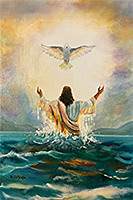Luke 12:49–59 . . . Bible Study Summary with Questions
Distress, Division, and Dispute
A variety of responses can be aroused by the word "fire." In today's text, Jesus speaks about fire, saying that he'd come to "bring fire upon the earth" (v. 49, shown below). Jesus said that he was eager to kindle this fire. We'll start by first trying to understand the meaning of the "fire" that he speaks of in our text by exploring the ways in which "fire" was used in the Old Testament and by John the Baptist. We'll then learn why our Lord was eager to light this "fire" and how it can affect all men.
We'll see in vv. 49–53, Jesus explaining how his coming will "bring [or cast] fire on the earth," while expressing his eagerness to do so. Christ's second coming will cause considerable division within families, driving wedges between family members. In vv. 54–57, Jesus speaks specifically to the multitudes, pointing out a very serious hypocrisy, reminding them that while they can forecast tomorrow's weather by looking at present indicators, they can't see the coming kingdom of God that Christ's first coming foreshadowed. Finally, vv. 58–59 provide a very personal and practical application: Reconcile with an opponent instead of bringing your dispute to a judge.
Christ's Coming Will Have Consequences (12:49–53)
Jesus has a distressing mission, part of which includes "judgment," as indicated by his "bringing fire" warning and John the Baptist's reference in Luke 3:16–17, which you ought to read now. . . Jesus was more than a prophet, but he was certainly the Father's prophet to the people of Israel. He warned them; he called them to account; he summoned them to repentance, all this so that he wouldn't need to decide against them at the great Judgment Seat of the Messiah. While the fire represents future judgment, the baptism represents Jesus' own destiny on the cross.
It'll be helpful to make a few generalizations about "fire" as it's used in the Bible: Fire is closely linked with the presence and power of God; it's often used, symbolically or literally, as an instrument of divine wrath, exercised against sinners, Israelites and non-Jewish Gentiles; biblical prophecy speaks of "fire" as being yet to come, brought by God against all sinners; the future fire of divine judgment is closely linked with the Messiah's coming; and, at the outset of Jesus' ministry, John the Baptist spoke of the coming Messiah who'll bring the fire of divine wrath, as opposed to peace.
You'd think that Jesus, the Prince of Peace, would bring peace. However, instead, he'll bring division (v. 51). Christ the Messiah must come first to deal with sins, later for judgment and a peaceful reign in the New Heavens and New Earth where righteousness dwells. Division will also appear within the family structure, sadly extending into followers' households (vv. 52–53). We're blessed when our whole household consists of believers. However, Jesus describes in those two verses a division in a typical household of five: father, mother, daughter, son, and son's wife. Yes, individuals can find inner peace and tranquility once they choose Jesus to become their Lord. But outer peace and tranquility won't come for many until the Messiah reigns over all.
Whether or Not to Interpret Weather Signs (vv. 54–57)
Now Jesus will tell a parable of weather forecasting. Palestine has fairly predictable weather patterns, with prevailing winds blowing from the Mediterranean, east across Palestine. Thus, a western rain cloud blowing easterly will bring rain; they were used to that. But when the winds shifted and a south wind would begin to blow, they knew that it would be hot; air blowing across the sweltering sands of the Negev Desert in the south would result in increased heat. They can understand signs of weather changes, but they're unable to understand and accept signs of a significant spiritual change.
If vv. 49–53 spell out the negative consequences of Christ's coming, vv. 54–59 are a challenge to man to respond appropriately to his coming. We ought to now see, in vv. 54–57, how we're called upon to think clearly and independently, then act decisively. Finally, our Lord concludes, in vv. 58–59, shown in the following section, by challenging his listeners to listen to his words and act quickly.
Jesus focuses now on the hypocrisy of the crowds or masses (v. 54). A hypocrite is one who acts inconsistently or doesn't act as he or she believes. The people all knew how to judge the future in the light of the present. Jesus illustrated this by documenting that they knew well how to predict the weather. The ability to judge evidence by appreciating its implications wasn't restricted to experts. Everyone would come to the same conclusion from the evidence they viewed and evaluated. Why, then, were these people, albeit skilled at reaching conclusions about the weather, unable to conclude that Jesus was the Messiah? They could have based that life-changing conclusion on the mountains of evidence that had piled up, all of which conformed perfectly to many prophets' predictions!
Be Smart! Judge for Yourselves (vv. 58–59)
Were Israel's leaders guilty? Certainly they were, but this didn't let the masses off the hook. They should have seen the obvious and come to the right conclusion about Jesus, even if their leaders didn't. Jesus' rebukes the masses seemingly because they didn't think clearly or independently of their leaders; they were guilty of letting their leaders think for them. Listen to our Lord's words again: "Why don't you judge for yourselves what is right?" You should have thought for yourselves, Jesus charged. Your leaders were guilty, but so were you for following them. Let the crowd look at the evidence and judge rightly.
Jesus concludes by telling a parable about civil litigation over a debt, as follows: You owe someone a great deal of money, but you won't or can't pay up. So your creditor takes you to court. The case is black and white. You'll surely lose in court and then be sentenced to debtor's prison until your friends pay off your debt ("to the last penny") so you can be released (that is, if you have friends who'll pay your debt for you). A smart man, Jesus says, will settle out of court, come to an agreement that satisfies his creditor, and appeal to his creditor for mercy, since, if your dispute goes before the judge, it'll definitely go against you. "Why don't you judge for yourselves what is right?" Jesus asks. Why wait for a judge to declare what you already know to be true? Your only hope is in settling the matter before receiving the inevitable, painful judgment against you.
What does the parable mean? Quite likely, the parable has a single point: If you know that the judgment will go against you, you're a fool not to try to settle the case out of court. In other words, if you know that you're subject to God's judgment, you need to plead to God for mercy now, while there's still time to receive mercy. Jesus is God's offer of mercy. No matter how hearty you feel, you're a fool if you don't reach out to him to ask for and receive mercy and forgiveness through him.
Note: The gospel of Luke opens with the birth of Jesus. In the first nine chapters, Luke shows how Jesus is the Messiah and God's true prophet to Israel. In this next section, Jesus and his disciples go on a long trip to Jerusalem to celebrate the Passover. Highlights in the following ten chapters include:
Jesus sends seventy-two disciples | The “Lord’s Prayer” taught by Jesus
Fifteen well-known Jesus parables | Jesus’ Sorrowfulness for Jerusalem
The coming of the kingdom of God | Jesus Comes to Jerusalem as King
› Watch BibleProject’s superb animated video (5 min.) that includes several highlights included in chs. 9–19 of Luke’s gospel.
- Q. 1 Why does the gospel of peace often bring divisions in our families? What can we do about that? (vv. 49–53)
- Q. 2 What are the "signs" in our own day that point to the coming soon of the Son of Man and judgment? (vv. 54–56)
- Q. 3 What lessons does the Parable of the Guilty Defendant teach us as disciples? (vv. 57–59)
Luke 12:49–59 (Lukas)
New International Version (NIV)
[To view it in a different version, click here; also listen to chapter 12]
Not Peace but Division
49"I have come to bring fire on the earth, and how I wish it were already kindled! 50But I have a baptism to undergo, and what constraint I am under until it is completed! 51Do you think I came to bring peace on earth? No, I tell you, but division. 52From now on there will be five in one family divided against each other, three against two and two against three. 53They will be divided, father against son and son against father, mother against daughter and daughter against mother, mother-in-law against daughter-in-law and daughter-in-law against mother-in-law."
Interpreting the Times
54He said to the crowd: "When you see a cloud rising in the west, immediately you say, 'It's going to rain,' and it does. 55And when the south wind blows, you say, 'It's going to be hot,' and it is. 56Hypocrites! You know how to interpret the appearance of the earth and the sky. How is it that you don't know how to interpret this present time?
57"Why don't you judge for yourselves what is right? 58As you are going with your adversary to the magistrate, try hard to be reconciled on the way, or your adversary may drag you off to the judge, and the judge turn you over to the officer, and the officer throw you into prison. 59I tell you, you will not get out until you have paid the last penny."

